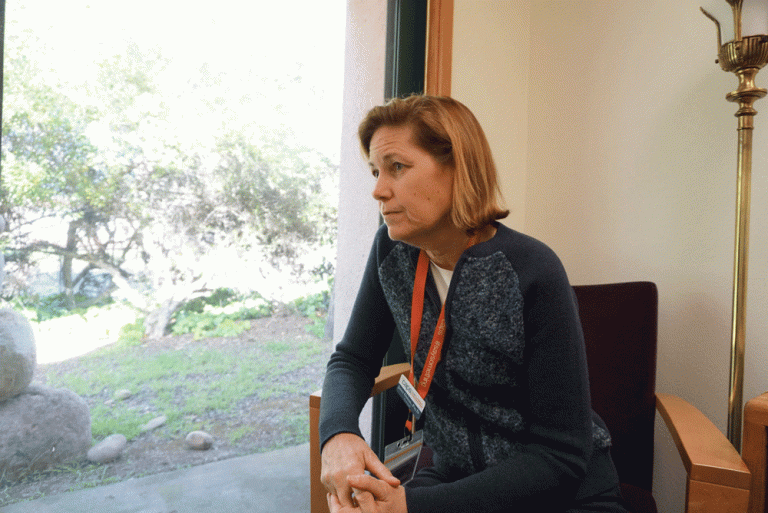
Yao Yang
As there is an increasing number of mental health-related incidents appearing on campus, it is common to see students struggling through stress, depression, the current political climate, and various other issues. To deal with these problems, there are groups to turn to and services provided on campus.
One of the most professional and effective mental health services, the Counseling and Psychological Services (CAPS), promotes the emotional well-being of students through short-term and individual psychological therapy, crisis intervention, and stress management services.
Janet Osimo, a psychologist and the senior manager for policy and outreach of CAPS, has offered suggestions to The Bottom Line for promoting self-care, as well as generally changing ourselves for the better.
What are the most common issues that students come to talk about?
The most common thing that we see is about anxiety. And what’s really driving anxiety is academic concerns. We also see students who are concerned about depression, but I would say the number one thing is anxiety.
One main thing that really adds to anxiety and depression is lack of sleep. For college students, especially when you are in academic environment, it can be hard to get sleep. And that sort of perpetuates the problem.
So, we really try to help stressed people taking care of themselves. Also diet and exercise, and talking to other people; these are all things that are helpful.
What are your thoughts on the recent news on campus?
You know, suicide is the second leading cause to death on college students — every year about 1,100 students die by suicide. Unfortunately, it’s something that happens.
That’s why we have the #SaySomething campaign. And it’s really about encouraging students to say something if they are concerned about somebody else, or to talk about themselves and reach out for help.
There’s a lot of things that we offer here at CAPS. It’s not just counseling. There’s a group therapy, the egg chairs, the massage chairs, and trained mental health peers if they don’t want to talk to a psychologist. [Its important] to reach out, either to their professors or TAs, or somebody they feel safe with. Even if you don’t feel like talking to anybody, if you just sit in a coffee shop and [don’t] talk to anybody, you are better off than if you are in your room alone.
We have this kind of misunderstanding that we are alone in our struggle, and that no one else is experiencing this, and everybody else has this figured out. But I can guarantee you that there are other folks struggling too. And what we are all struggling with are a lot of the same things, ‘cause we are all human.
What are some suggestions for changing oneself for the better?
I think a lot of, not just students, but people in general, will do a lot for themselves by accepting who they are. We are always trying to change ourselves, [like] be more like our friends, or be more outgoing, or be more social … rather than just understanding who we are as individuals, and accept that.
And recognize that there are some things you are good at, and there are some things you are not. There are some things that you could work on to get better, some things you can’t. So I think self-compassion and self-acceptance are probably one of the most powerful things that we can do, to get better.
As the university enrolls more people, it is harder to take care of each individual and provide help. Do you think that the university should take this factor into consideration regarding students’ mental health conditions?
Specifically, for appointment with CAPS, the wait times can get longer, especially around midterms, or other specific time periods. But what we do have every day [is that] any student can walk in and see a counselor the same day. So, if they feel like they have an urgent situation or there’s a time-sensitive decision, they can come in and talk to somebody right away.
We don’t define what’s urgent. The student defines what’s urgent. Now, they may have to wait like, I think our longest wait time has been two hours, but I would say average is between 20 minutes to … maybe an hour. So that’s probably far less if you went to an emergency room.
How do you define self-care?
Self-care is about taking care of yourself physically, emotionally, and spiritually. When talking about how can people engage in self-care, make sure that you eat, sleep, and exercise, do things that you enjoy and that gives you energy — take a break from studying.
A lot of the research shows that, when you sleep better and exercise, you learn faster and better, and you can concentrate more. It’s much better to sleep and get things they learned into long-term memory than staying up all night to cram for test.
We really talk about deep breathing, which helps to calm down your brain. People usually overthink things. It’s really important to just disrupt that pattern, as it snowballs and gets bigger and bigger. To slow down your thinking by doing some deep breathing, meditation, yoga, or just walking quickly to class, taking the stairs, whatever, that will be more helpful than not doing anything. It doesn’t have to be a lot of work.










